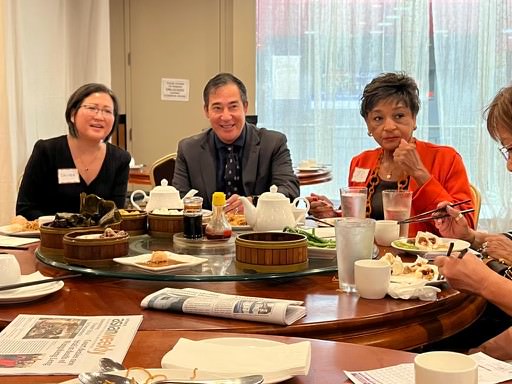By Jason Cruz
Northwest Asian Weekly

A dialogue with Secretary of State Steve Hobbs is organized by Northwest Asian Weekly at Joyale Restaurant. (Photo provided by Jason Liu)
A panel of local community leaders gathered at a luncheon on Oct. 10 to discuss ways to get voters to the ballot box. Washington State Secretary of State Steven Hobbs was the featured guest as he discussed his office’s role in ensuring election security as the November 2022 midterm election nears.
Hobbs is looking to retain his position as the state’s Secretary of State, which he was appointed to by Gov. Jay Inslee last November when Kim Wyman departed to work for President Biden’s administration.
Hobbs discussed issues his office faces with election security, cyberattacks, misinformation, and ways in which his office can get out correct and accurate messaging about voting.
Due to a multitude of accusations by former President Donald Trump, election security, fraudulent voting, and a faulty voting process were prevalent talking points in 2020. The former president’s false narrative that the election for the U.S. Presidency was “rigged” resonated with his supporters and caused turmoil in national, state, and local elections.

From left: Colleen Fukui-Sketchley, Secretary of State Steve Hobbs, and Jonelle Johnson (Photo by Assunta Ng)
“I never thought I would see the level of misinformation and violence in my own country,” Hobbs said of the Jan. 6, 2021 attack on the nation’s capital based on lies spread by the former president.
Hobbs touts experience handling election security. He currently serves as a Lieutenant Colonel in the Washington Army National Guard where he has helped oversee elections in Kosovo and Iraq.
In his time as Secretary of State, he’s also led efforts to curb the threat of cyberattacks domestic and foreign that might impact elections within the state, and worked with all of the county auditors in the state to provide security support and voter education.
Hobbs stated that his office needs to do a better job of getting out the message of voting and how elections work. He discussed the reasons why some ballots are not counted and believes that educating the public on some primary issues would be helpful. He noted that voters need to sign their ballot. Ballots do not get counted if voters do not sign it. Hobbs stated that since cursive is not taught in schools anymore, some younger voters’ scribbles and scratches on signature lines are not counted. He indicated that simply printing your name legibly would suffice on the line.
His office is also looking at ways to enhance ballot curing. This involves notifying a voter that has a ballot that will not be counted. This can be cured if the voter makes the appropriate correction.
This method takes a long time which may mean that those votes will not be counted even if cured.
The discussion with Hobbs helped community leaders address election integrity issues.
“This was great information,” said Paul Tabayoyon, a community leader in the Yakima Valley in Wapato, Washington. “[A]s community leaders, we are always looking for additional information and some form of guidance to put our organization in a more organized manner.” Tabayoyon is an outreach coordinator for the Asian Pacific Islander Coalition of Yakima County, a community-based organization.

A dialogue with Secretary of State Steve Hobbs is organized by Northwest Asian Weekly at Joyale Restaurant. (Photo provided by Jason Liu)
“It’s important that we hear these things (issues of disinformation regarding voting), because if we don’t, we may neglect talking about these things.” He noted that there have been instances of disinformation where unidentified groups have been telling citizens in the Latino community not to vote in the November election. There were no reasons given, but it left Tabayoyon wondering why an organization would not want a community of people to vote. In order to educate the population, he said that they have put together commercials on the radio and television in Yakima.
They are looking to put the commercials and ads in Spanish to make sure that they reach everyone in the area. He’s also helping to coordinate a “Ballot Reviewing” Party, where the community comes together to talk and learn about the candidates.
“In some of the rural communities, you do not see a lot of politicians circulate as they do in city centers.”
“I think like any other culture, it’s all across the board,” Tabayoyon said about the amount of interest people in his community have in politics. There are conservative voters, there are liberal voters, but Tabayoyon says they all have one thing in common.
“They all share family values,” noting that their interests are vested in how certain decisions are made by government leaders.
He also noted that the young people in Wapato have shown an interest.
“In the last couple years, a lot of kids want to be involved.” He noted this is due in part due to the isolation in COVID.
In fact, getting the younger generation to come out to vote was an important message stressed by Hobbs. In order to engage younger people, Hobbs proposes the gamification of the election process. He is working on a mobile game application which would include civics questions to educate kids from middle school through high school about the basics of voting. He also is looking into a table top game for those interested in those types of games. Other ways of becoming more visible to the younger generation is by having a booth at Emerald City Comic Con and reaching out to sports teams such as the Seahawks and the Kraken.
Election Day is Nov. 8.
Visit sos.wa.gov/elections/dates-and-deadlines for more information.
Jason can be reached at info@nwasianweekly.com.



